The Sol Goldman Pancreatic Cancer Research Center was established at Johns Hopkins in 2005 by the family of Sol and Lillian Goldman. This collaborative center supports cutting-edge pancreatic cancer research and hosts a thought-provoking annual Think Tank.
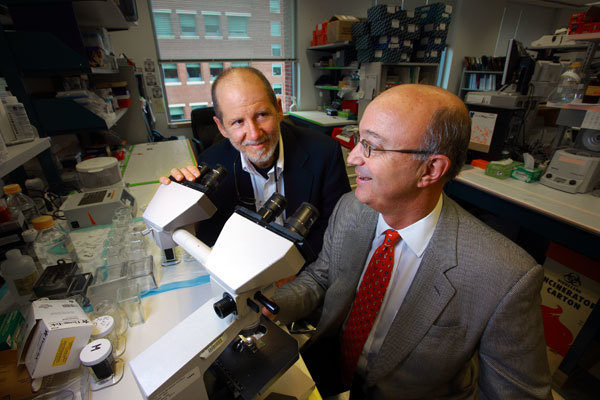
The History of the Center
The Sol Goldman Charitable Trust, a New York-based philanthropy endowed The Sol Goldman Pancreatic Cancer Research Center at Johns Hopkins in 2005. This center supports a multi-disciplinary team of physicians and scientists. The gift of $10 million to endow the center, one of the largest ever to a pathology department, represents the remarkable vision of Jane Goldman, a New York real estate developer. After losing her mother, Lillian Goldman, to pancreatic cancer in 2002, Jane decided to take action against the disease that took her mother's life. With the help of her husband, Dr. Benjamin Lewis, the family approached the team at Johns Hopkins with the goal of endowing a pancreatic cancer research center that would not only combat this terrible disease, but would also honor the legacy of Jane's parents, Sol and Lillian Goldman.
The newly endowed center is named The Sol Goldman Pancreatic Cancer Research Center. Sol Goldman started the family real estate business at the age of 17. He and Lillian were married when Lillian was 18, and together they built extensive real estate holdings including, briefly, the Belvedere Hotel here in Baltimore. The Sol Goldman Charitable Trust is an independent foundation established in 1988 in New York City to support the arts, education, the environment, health organizations, human services, and Jewish agencies.
One of the remarkable aspects of this gift to Johns Hopkins is that the Goldman family does not have historic ties to Hopkins. Instead, the family had the vision and selflessness to go beyond their native New York to seek out and support the leading pancreatic cancer research group. The group's team approach, past record of success, and desire to pursue novel ideas all attracted the Goldmans to Hopkins.
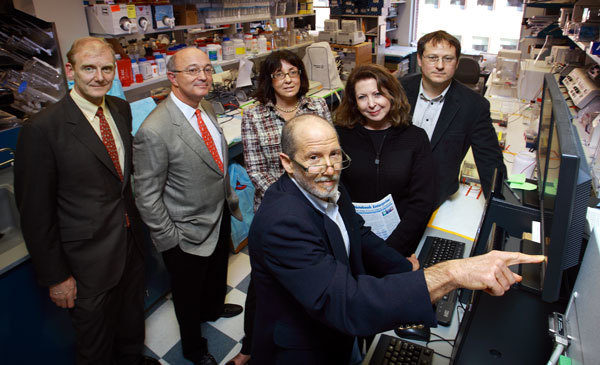
Leadership
The Center is directed by Dr. Ralph Hruban, and Dr. Laura Wood is the Deputy Director of the Center. Dr. Michael Goggins is the Sol Goldman Professor, and the Center includes leadership representation from the departments of Surgery, Oncology, Radiation Oncology and Radiology. Institutional leadership and the Goldman family also help guide the Center. In addition to Drs. Hruban, Wood and Goggins, this multi-disciplinary center includes Drs. Syed Ali, John Cameron, Marcia Canto, James Eshleman, Eliot Fishman, Scott Kern, Alison Klein, Dan Laheru, Marty Pomper, Nicholas Roberts, Elizabeth Thompson, Laura Wood, and Lei Zheng. The group also has a number of exciting collaborations across the campus, including additional investigators in the Institute for Genetic Medicine, Biomedical Engineering, and the School of Public Health. The secret to the success of the center has been that it brings together individuals with diverse backgrounds who collaborate in a multi-disciplinary way. Simply put, the Goldman Center leads the World in pancreatic cancer research.
Thanks to this extremely generous family, we can be assured that the war against pancreatic cancer will continue for years to come. Income from the endowment is used to support novel pancreatic cancer research. Each year a request for applications is distributed to all scientists throughout Hopkins, soliciting their interest in applying for research funding in the field of pancreas cancer. These grants are then reviewed by a scientific advisory board which awards funding to projects that hold the most promise.
Here's a list of books and papers from The Sol Goldman Pancreatic Cancer Research Center.
The inaugural round of awards were given in Fall of 2005 and 159 grants have been awarded to date. See the list of the awardees below.
Application for Funds & Grants
To submit an application to The Sol Goldman Pancreatic Cancer Research Center, please visit the Project Registration website.
For more information on applying, please find the guidelines below.
Sol Goldman Fellows
The Sol Goldman Fellowship recognizes outstanding trainees doing cutting edge pancreatic cancer research. The fellowship supports our early career scientists, at a point where they can pursue novel “high-risk” and “high impact” science. As such, the Fellowship plays an important role in the Center, helping to develop young talent into future independent investigators.
2024 - Abigail C. Cornwell, Ph.D. ▼
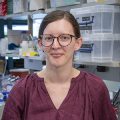
tba
2023 - Selina Shiqing Teh, Ph.D. ▼

Selina started her undergraduate education in the American Degree Program at KDU University College in Petaling Jaya, Malaysia, before moving to the United States in 2013 to complete her studies at Iowa State University (ISU) in Ames, graduating with her bachelor’s degree in genetics in 2016. While an undergraduate at ISU, she gained teaching experience as a tutor and teaching assistant, and worked as a research assistant in the laboratories of Andrew VanLoocke, Ph.D. and Marit Nilsen-Hamilton, Ph.D. In 2017, Selina came to Johns Hopkins to pursue her doctoral degree in the School of Medicine’s Cellular and Molecular Medicine Program under the mentorship of James Eshleman, M.D., Ph.D., graduating in August 2022. Her thesis was “CRISPR-Cas9 targeting of cancer cells.” While a Ph.D.-candidate, she spent two years as a fellow in the Johns Hopkins Technology Ventures’ Commercialization Academy. Selina is now a postdoctoral research fellow in Dr. Eshleman’s lab and is currently investigating the effect of genomic locations of double-strand DNA breaks on cytotoxicity.
2022 - Alexander Ioannis Damanakis, M.D. ▼

Alex obtained his MD from the Philips University of Marburg School of Medicine, Germany, spending part of his studies at the National and Kapodistrian University of Athens School of Medicine, Greece. He began his residency training at the Department of Visceral, Thoracic and Vascular Surgery at the University Hospital in Marburg and finished his residency training at the Department of General, Visceral, Cancer and Transplantation Surgery at the University Hospital of Cologne in 2018. There, he worked as a clinical fellow with a translational research focus. As part of his current training, Alex joined the Wood Lab in June 2021, to supplement his surgical oncology training with laboratory-based cancer research.
The focus of his research at the Wood Lab is tissue clearing with three-dimensional imaging of pancreatic ductal adenocarcinoma to study cancer growth in three dimensions. So far, Alex has optimized tissue clearing and labelling techniques allowing for deeper antibody penetration and thoroughly rendering the tissue transparent. Using light-sheet microscopy, the processed thick tumor samples can be imaged, and these high-resolution images can subsequently be converted into 3D. Alex received the 2022 Sol Goldman Pilot project grant to advance the computer-based image analysis of the 3D data sets. Using these techniques, he will analyze these images to determine the directionality vs randomness of cancer growth in relation to vascular and neural structures. He also collaborates with Peter Chianchiano from the Wood Lab to clear tissue engineered micro vessels with PDAC organoids.
2021 - Alicia Braxton, D.V.M. ▼
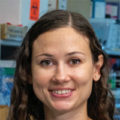
Alicia Braxton, D.V.M. has been selected as the fourth Sol Goldman Fellow in Pancreatic Cancer Research in the Johns Hopkins Department of Pathology.
Alicia is from Pittsboro, North Carolina. She earned her bachelor’s degree in Zoology from North Carolina State University (NC State), graduating in 2012 as valedictorian. Alicia then completed her Doctorate in Veterinary Medicine from the North Carolina State College of Veterinary Medicine in 2016. That summer, Alicia moved to Baltimore to pursue her post-doctoral fellowship in Laboratory Animal Medicine at Johns Hopkins, graduating in 2020. In July 2017, she began her Ph.D. studies in the Johns Hopkins Department of Cellular and Molecular Medicine and, in 2018, she joined the laboratory of Laura Wood, M.D., Ph.D.
Alicia’s current research is focused on characterizing the genetic heterogeneity in pancreatic intraepithelial neoplasia (PanINs), the most common precursor lesion to invasive pancreatic cancer. Alicia uses a novel three-dimensional modeling approach developed by the Wood Lab and combines it with next generation sequencing technologies. Using this cool approach, she has demonstrated that precancerous lesions have significant heterogeneity at the genetic level. Understanding this heterogeneity will help form a rational foundation for early detection approaches prior to the development of pancreatic cancer.
Alicia continues to work in Laura Wood’s lab at the present time.
Publications resulting from her work at Johns Hopkins
- Fujikura K, Hosoda W, Felsenstein M, Song Q, Reiter JG, Zheng L, Beleva Guthrie V, Rincon N, Dal Molin M, Dudley J, Cohen JD, Wang P, Fischer CG, Braxton AM, Noë M, Jongepier M, Fernández-Del Castillo C, Mino-Kenudson M, Schmidt CM, Yip-Schneider MT, Lawlor RT, Salvia R, Roberts NJ, Thompson ED, Karchin R, Lennon AM, Jiao Y, Wood LD. Multiregion whole-sequencing of Intraductal papillary mucinous neoplasms reveals frequent somatic KLF4 mutations predominantly in low-grade regions. Gut. 2020. Online ahead of print.
- Fujikura K, Hutchings D, Braxton AM, Zhu Q, Laheru DA, Hruban RH, Thompson ED, Wood LD. Intraductal pancreatic cancer is less responsive than cancer in the stroma to neoadjuvant chemotherapy. Mod Pathol. 33(10):2026-2034, 2020.
- Hong SM, Jung D, Kiemen A, Gaida MM, Yoshizawa T, Braxton AM, Noë M, Lionheart G, Oshima K, Thompson ED, Burkhart R, Wu PH, Wirtz D, Hruban RH, Wood LD. Three-dimensional visualization of cleared human pancreas cancer reveals that sustained epithelial-to-mesenchymal transition is not required for venous invasion. Mod Pathol. 33(4):639-647, 2020.
- Fischer CG, Beleva Guthrie V, Braxton AM, Zheng L, Wang P, Song Q, Griffin JF, Chianchiano PE, Hosoda W, Niknafs N, Springer S, Dal Molin M, Masica D, Scharpf RB, Thompson ED, He J, Wolfgang CL, Hruban RH, Roberts NJ, Lennon AM, Jiao Y, Karchin R, Wood LD. Intraductal Papillary Mucinous Neoplasms Arise From Multiple Independent Clones, Each With Distinct Mutations. Gastroenterology. 157(4):1123-1137, 2019.
2020 - Kohei Fujikura, M.D., Ph.D. ▼

Kohei Fujikura, M.D., Ph.D. was selected as the third Sol Goldman Fellow in Pancreatic Cancer Research in the Department of Pathology at Johns Hopkins Medicine.
Kohei was born in Tokyo, Japan, and received his bachelor’s and master’s degrees in biology from the University of Tokyo. After graduating, he earned both his medical and doctoral degrees from the Kobe University School of Medicine in Kobe, Japan, where he also completed his residency training in pathology in 2017. Following residency, he joined the faculty of Kobe University as an assistant professor in diagnostic pathology. In 2018, Kohei came to Johns Hopkins as a postdoctoral fellow in the laboratory of Laura D. Wood, M.D., Ph.D.
Kohei is now a postdoctoral fellow at the University of British Columbia.
Publications resulting from his work at Johns Hopkins
- Fujikura K, Hosoda W, Felsenstein M, Song Q, Reiter JG, Zheng L, Beleva Guthrie V, Rincon N, Dal Molin M, Dudley J, Cohen JD, Wang P, Fischer CG, Braxton AM, Noë M, Jongepier M, Fernández-Del Castillo C, Mino-Kenudson M, Schmidt CM, Yip-Schneider MT, Lawlor RT, Salvia R, Roberts NJ, Thompson ED, Karchin R, Lennon AM, Jiao Y, Wood LD. Multiregion whole-exome sequencing of Intraductal papillary mucinous neoplasms reveals frequent somatic KLF4 mutations predominantly in low-grade regions. Gut. 2020. Online ahead of print.
- Pflüger MJ, Felsenstein M, Schmocker R, Wood LD, Hruban R, Fujikura K, Rozich N, van Oosten F, Weiss M, Burns W, Yu J, Cameron J, Pratschke J, Wolfgang CL, He J, Burkhart RA. Gastric cancer following pancreaticoduodenectomy: experience from a high-volume center and review of existing literature. Surg Open Sci. 2(4):32-40, 2020.
- Huang B, Trujillo MA, Fujikura K, Qiu M, Chen F, Felsenstein M, Zhou C, Skaro M, Gauthier C, Macgregor-Das A, Hutchings D, Hong SM, Hruban RH, Eshleman JR, Thompson ED, Klein AP, Goggins M, Wood LD, Roberts NJ. Molecular characterization of organoids derived from pancreatic intraductal papillary mucinous neoplasms. J Pathol. 2020.
- Fujikura K, Hutchings D, Braxton AM, Zhu Q, Laheru DA, Hruban RH, Thompson ED, Wood LD. Intraductal pancreatic cancer is less responsive than cancer in the stroma to neoadjuvant chemotherapy. Mod Pathol. 2020.
- Huang W, Navarro-Serer B, Jeong YJ, Chianchiano P, Xia L, Luchini C, Veronese N, Dowiak C, Ng T, Trujillo MA, Huang B, Pflüger MJ, Macgregor-Das AM, Lionheart G, Jones D, Fujikura K, Nguyen-Ngoc KV, Neumann NM, Groot VP, Hasanain A, van Oosten AF, Fischer SE, Gallinger S, Singhi AD, Zureikat AH, Brand RE, Gaida MM, Heinrich S, Burkhart RA, He J, Wolfgang CL, Goggins MG, Thompson ED, Roberts NJ, Ewald AJ, Wood LD. Pattern of Invasion in Human Pancreatic Cancer Organoids Is Associated with Loss of SMAD4 and Clinical Outcome. Cancer Res. 80(13):2804-2817, 2020.
2019/2018 - Matthäus Felsenstein, M.D. ▼

Matthäus Felsenstein, M.D. was selected as the second Sol Goldman Fellow in Pancreatic Cancer Research in the Department of Pathology at Johns Hopkins Medicine.
Matt received his medical and doctoral degrees from Charité University School of Medicine in Berlin, Germany. During this time, he completed his doctoral thesis on tumor immunology of malignant gliomas in the Department of Experimental Neurosurgery at Charité University. In 2016, Matt came to Johns Hopkins to complete a post-doctoral fellowship in the laboratory of Laura Wood, M.D., Ph.D. His research projects while at Johns Hopkins included the development of novel in vitro culture models of normal pancreatic ductal cells, as well as genetic analyses of precursor lesions in the pancreas. Matt received a Sol Goldman pilot project grant for 2018 for his project titled “Development of an in vitro tumorigenesis model for pancreatic cancer.
Matt is currently a surgery resident for his clinical training in pancreatic surgery at Charité University in Berlin, Germany.
Publications resulting from his work at Johns Hopkins
- Fujikura K, Hosoda W, Felsenstein M, Song Q, Reiter JG, Zheng L, Beleva Guthrie V, Rincon N, Dal Molin M, Dudley J, Cohen JD, Wang P, Fischer CG, Braxton AM, Noë M, Jongepier M, Fernández-Del Castillo C, Mino-Kenudson M, Schmidt CM, Yip-Schneider MT, Lawlor RT, Salvia R, Roberts NJ, Thompson ED, Karchin R, Lennon AM, Jiao Y, Wood LD. Multiregion whole-exome sequencing of Intraductal papillary mucinous neoplasms reveals frequent somatic KLF4 mutations predominantly in low-grade regions. Gut. 2020. Online ahead of print.
- Pflüger MJ, Felsenstein M, Schmocker R, Wood LD, Hruban R, Fujikura K, Rozich N, van Oosten F, Weiss M, Burns W, Yu J, Cameron J, Pratschke J, Wolfgang CL, He J, Burkhart RA. Gastric cancer following pancreaticoduodenectomy: experience from a high-volume center and review of existing literature. Surg Open Sci. 2(4):32-40, 2020.
- Huang B, Trujillo MA, Fujikura K, Qiu M, Chen F, Felsenstein M, Zhou C, Skaro M, Gauthier C, Macgregor-Das A, Hutchings D, Hong SM, Hruban RH, Eshleman JR, Thompson ED, Klein AP, Goggins M, Wood LD, Roberts NJ. Molecular characterization of organoids derived from pancreatic intraductal papillary mucinous neoplasms. J Pathol. 2020
- Felsenstein M, Trujillo MA, Huang B, Nanda N, Jiang Z, Jeong YJ, Pflüger M, Goggins MG, Hruban RH, Thompson ED, Heaphy CM, Roberts NJ, Wood LD. Generation and characterization of a cell line from an intraductal tubulopapillary neoplasm of the pancreas. Lab Invest. 100(7):1003-1013, 2020.
- Singhi AD, Wood LD, Parks E, Torbenson MS, Felsenstein M, Hruban RH, Nikiforova MN, Wald AI, Kaya C, Nikiforov YE, Favazza L, He J, McGrath K, Fasanella KE, Brand RE, Lennon AM, Furlan A, Dasyam AK, Zureikat AH, Zeh HJ, Lee K, Bartlett DL, Slivka A. Recurrent Rearrangements in PRKACA and PRKACB in Intraductal Oncocytic Papillary Neoplasms of the Pancreas and Bile Duct. Gastroenterology. 158(3):573-582, 2020.
- Skaro M, Nanda N, Gauthier C, Felsenstein M, Jiang Z, Qiu M, Shindo K, Yu J, Hutchings D, Javed AA, Beckman R, He J, Wolfgang CL, Thompson E, Hruban RH, Klein AP, Goggins M, Wood LD, Roberts NJ. Prevalence of Germline Mutations Associated With Cancer Risk in Patients With Intraductal Papillary Mucinous Neoplasms. Gastroenterology. 156(6):1905-1913, 2019.
- Noë M, Pea A, Luchini C, Felsenstein M, Barbi S, Bhaijee F, Yonescu R, Ning Y, Adsay NV, Zamboni G, Lawlor RT, Scarpa A, Offerhaus GJA, Brosens LAA, Hruban RH, Roberts NJ, Wood LD. Whole-exome sequencing of duodenal neuroendocrine tumors in patients with neurofibromatosis type 1. Mod Pathol. 31(10):1532-1538, 2018.
- Felsenstein M, Noë M, Masica DL, Hosoda W, Chianchiano P, Fischer CG, Lionheart G, Brosens LAA, Pea A, Yu J, Gemenetzis G, Groot VP, Makary MA, He J, Weiss MJ, Cameron JL, Wolfgang CL, Hruban RH, Roberts NJ, Karchin R, Goggins MG, Wood LD. IPMNs with co-occurring invasive cancers: neighbors but not always relatives. Gut. 67(9):1652-1662, 2018.
- Felsenstein M, Hruban RH, Wood LD. New Developments in the Molecular Mechanisms of Pancreatic Tumorigenesis. Adv Anat Pathol. 25(2):131-142, 2018.
- Luchini C, Robertson SA, Hong SM, Felsenstein M, Anders RA, Pea A, Nottegar A, Veronese N, He J, Weiss MJ, Capelli P, Scarpa A, Argani P, Kapur P, Wood LD. PBRM1 loss is a late event during the development of cholangiocarcinoma. Histopathology. 71(3):375-382, 2017.
2017 - Waki Hosada, M.D., Ph.D. ▼
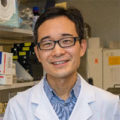
Waki Hosoda, M.D., Ph.D. was selected as the inaugural Sol Goldman Fellow in Pancreatic Cancer Research in the Department of Pathology at Johns Hopkins Medicine.
Waki was born in Kyoto, Japan and in 1995, he received his bachelor of science in developmental biology from Nagoya University. In 2001, Waki received his medical degree from Shinshu University School of Medicine where he completed his residency and fellowship in internal and laboratory medicine. In 2013, while serving as Staff Pathologist at Aichi Cancer Center Hospital, Waki received his Ph.D. from Nagoya University School of Medicine. His special interest lies in pathology and genetics of pancreatic tumors. He worked in the laboratory of Laura Wood, M.D., Ph.D., from 2015 to 2018 focusing on characterizing the genetic alterations in high-grade precursors of pancreatic cancer. His study is a real tour de force, and his results are simply ground-breaking.
Waki currently holds the position of staff pathologist in the Department of Pathology and Molecular Diagnostics, Aichi Cancer Center, Aichi, Japan.
Publications resulting from his work at Johns Hopkins
- Fujikura K, Hosoda W, Felsenstein M, Song Q, Reiter JG, Zheng L, Beleva Guthrie V, Rincon N, Dal Molin M, Dudley J, Cohen JD, Wang P, Fischer CG, Braxton AM, Noë M, Jongepier M, Fernández-Del Castillo C, Mino-Kenudson M, Schmidt CM, Yip-Schneider MT, Lawlor RT, Salvia R, Roberts NJ, Thompson ED, Karchin R, Lennon AM, Jiao Y, Wood LD. Multiregion whole-sequencing of Intraductal papillary mucinous neoplasms reveals frequent somatic KLF4 mutations predominantly in low-grade regions. Gut. 2020. Online ahead of print.
- Noë M, Niknafs N, Fischer CG, Hackeng WM, Beleva Guthrie V, Hosoda W, Debeljak M, Papp E, Adleff V, White JR, Luchini C, Pea A, Scarpa A, Butturini G, Zamboni G, Castelli P, Hong SM, Yachida S, Hiraoka N, Gill AJ, Samra JS, Offerhaus GJA, Hoorens A, Verheij J, Jansen C, Adsay NV, Jiang W, Winter J, Albores-Saavedra J, Terris B, Thompson ED, Roberts NJ, Hruban RH, Karchin R, Scharpf RB, Brosens LAA, Velculescu VE, Wood LD. Genomic characterization of malignant progression in neoplastic pancreatic cysts. Nat Commun. 11(1):4085. doi: 10.1038/s41467-020-17917-8, 2020.
- Fischer CG, Beleva Guthrie V, Braxton AM, Zheng L, Wang P, Song Q, Griffin JF, Chianchiano PE, Hosoda W, Niknafs N, Springer S, Dal Molin M, Masica D, Scharpf RB, Thompson ED, He J, Wolfgang CL, Hruban RH, Roberts NJ, Lennon AM, Jiao Y, Karchin R, Wood LD. Intraductal Papillary Mucinous Neoplasms Arise From Multiple Independent Clones, Each With Distinct Mutations. Gastroenterology. 157(4):1123-1137, 2019.
- Kuboki Y, Fischer CG, Beleva Guthrie V, Huang W, Yu J, Chianchiano P, Hosoda W, Zhang H, Zheng L, Shao X, Thompson ED, Waters K, Poling J, He J, Weiss MJ, Wolfgang CL, Goggins MG, Hruban RH, Roberts NJ, Karchin R, Wood LD. Single-cell sequencing defines genetic heterogeneity in pancreatic cancer precursor lesions. J Pathol. 247(3):347-356, 2019.
- Felsenstein M, Noë M, Masica DL, Hosoda W, Chianchiano P, Fischer CG, Lionheart G, Brosens LAA, Pea A, Yu J, Gemenetzis G, Groot VP, Makary MA, He J, Weiss MJ, Cameron JL, Wolfgang CL, Hruban RH, Roberts NJ, Karchin R, Goggins MG, Wood LD. IPMNs with co-occurring invasive cancers: neighbors but not always relatives. Gut. 67(9):1652-1662, 2018.
- Hosoda W, Chianchiano P, Griffin JF, Pittman ME, Brosens LA, Noë M, Yu J, Shindo K, Suenaga M, Rezaee N, Yonescu R, Ning Y, Albores-Saavedra J, Yoshizawa N, Harada K, Yoshizawa A, Hanada K, Yonehara S, Shimizu M, Uehara T, Samra JS, Gill AJ, Wolfgang CL, Goggins MG, Hruban RH, Wood LD. Genetic analyses of isolated high-grade pancreatic intraepithelial neoplasia (HG-PanIN) reveal paucity of alterations in TP53 and SMAD4. J Pathol. 242(1):16-23, 2017.
- Hosoda W, Wood LD. Molecular Genetics of Pancreatic Neoplasms. Surg Pathol Clin. 9(4):685-703, 2016.
- Hackeng WM, Brosens LA, Poruk KE, Noë M, Hosoda W, Poling JS, Rizzo A, Campbell-Thompson M, Atkinson MA, Konukiewitz B, Klöppel G, Heaphy CM, Meeker AK, Wood LD. Aberrant Menin expression is an early event in pancreatic neuroendocrine tumorigenesis. Hum Pathol. 56:93-100, 2016.
Awardees
Beginning 2005, income from the Sol Goldman Pancreatic Cancer Research Center endowment, generously donated by the Goldman family, has funded 159 grant proposals, benefiting 63 principal investigators from 16 departments exploring novel avenues of research.
2024 ▼
- James R. Eshleman, M.D., Ph.D.
Ralph H. Hruban Professor in Pancreatic Cancer Research
Synergy of CRISPR-Cas9 guide RNA to kill pancreatic cancers
- Peter Espenshade, Ph.D.
Professor of Cell Biology and Oncology
Impact of a Western Diet on the PDAC Tumor Microenvironment
- Jesse Handler, M.D., Ph.D.
Research and Clinical Fellow in Biomedical Engineer & Oncology
Mapping Gene Regulatory Networks Driving PDAC Liver Metastasis for Rational Anti-Metastatic Therapy Design
- Chuan-Hsiang Bear Huang, M.D., Ph.D.
Associate Professor of Pathology
A novel platform for identifying pancreatic cancer drug targets based on signaling dynamics
- Ashley Kiemen, Ph.D.
Assistant Professor of Pathology
Profiling the unique transcriptomic properties of pancreatic cancer perineural invasion
- Alison Klein, Ph.D., MPH
Professor of Oncology and Pathology
Assessing facilitators and barriers of pancreatic cancer genetic testing and screening
- Janielle Maynard, Ph.D.
Assistant Professor in Pathology
P2X4 preceptor function in macrophages within the pancreatic tumor microenvironment
- Nicholas Roberts, Vet.M.B., Ph.D.
Assistant Professor of Pathology
Identifying molecular targets for therapy and interception using orthogonal screens
- Laura Wood, M.D., Ph.D.
Associate Professor in Pathology and Oncology
Identifying molecular targets for therapy and interception using orthogonal screens
2023 ▼
- Venkata Akshintala
Assistant Professor in Gastroenterology
Artificial Intelligence (AI)-based Computer-Aided Early Detection of Pancreas Cancer using Endoscopic Ultrasonography
- Alexander Ioannis Damanakis, M.D.
Postdoctoral Research Fellow in GI/Liver Pathology
Three-dimensional geometric quantification of cancer shape to elucidate mechanisms of vascular invasion
- James R. Eshleman, M.D., Ph.D.
Ralph H. Hruban Professor in Pancreatic Cancer Research
Optimizing CRISPR-Cas9 induced toxicity in Pancreatic Cancers
- Chuan-Hsiang 'Bear' Huang, M.D., Ph.D.
Associate Professor of Pathology
Imaging signaling activities in pancreatic cancer organoids using biosensor barcoding
- Anthony Leung, Ph.D.
Professor in Biochemistry and Molecular Biology
Targeting Stress Granule Formation in Pancreatic Ductal Adenocarcinoma
- Janielle Maynard, Ph.D.
Assistant Professor in Pathology
P2Y2 and P2X4 purinergic receptor function in pancreatic cancer.
- Nicholas Roberts, Vet.M.B., Ph.D.
Assistant Professor of Pathology
Functional characterization of MLH1 variants of uncertain significance
- Hiromi Sesaki, Ph.D.
Professor in Cell Biology
Limiting Mitochondrial Fusion as a Novel Strategy to Alleviate PDAC
- Laura Wood, M.D., Ph.D.
Associate Professor in Pathology and Oncology
Molecular Interrogation of Therapeutic Response in Matched Primary and Metastatic Pancreatic Cancer Samples
2022 ▼
- Alexander Ioannis Damanakis, M.D.
Postdoctoral Research Fellow in GI/Liver Pathology
Enhancing permeabilization and tissue clearing of thick human PDAC samples and three-dimensional growth pattern analysis with evaluation of FOLFIRINOX treatment effects
- James R. Eshleman, M.D., Ph.D.
Ralph H. Hruban Professor in Pancreatic Cancer Research
Are CRISPR-Cas9 targets in PDAC retained in metastases?
- Peter Espenshade, Ph.D.
Professor of Cell Biology and Oncology
Effect of Chemical and Dietary Modifiers of Ferroptosis on SCAP Inhibition in PDAC
- Jesse Handler, M.D., Ph.D.
Postdoctoral Research and Clinical Fellow in Medical Oncology
Describing the development of extrachromosomal circular DNAs (ecDNAs) within the natural history of pancreatic ductal adenocarcinoma (PDAC)
- Chuan-Hsiang (Bear) Huang, M.D., Ph.D.
Assistant Professor of Pathology
Targeting the PI3K-FAK axis in pancreatic cancer
- Miho Iijima, M.S., Ph.D.
Professor of Cell Biology
Phospho-regulation of KRAS and RHOA in PDAC
- Nicholas Roberts, Vet.M.B., Ph.D.
Assistant Professor of Pathology and Oncology
ATM function in pancreatic tumorigenesis
- Laura Wood, M.D., Ph.D.
Associate Professor in Pathology and Oncology
Spatial Transcriptomics Analysis of Treatment Resistant Pancreatic Cancer Cells
2021 ▼
- Todd Armstrong, Ph.D.
Senior Research Scientist in Oncology
Developing Iron Oxide Nanoparticles as a Combination Vaccine for Pancreatic Cancer
- James Eshleman, M.D., Ph.D.
Ralph H. Hruban Professor in Pancreatic Cancer Research
Are CRISPR-Cas9 targets in PDAC retained in metastases?
- Chuan-Hsiang (Bear) Huang, M.D., Ph.D.
Assistant Professor of Pathology
Targeting the PI3-FAK axis in pancreatic cancer
- Miho Iijima, M.S., Ph.D.
Professor of Cell Biology
Targeting the KRAS/RHOA-mTORC2-AKT (KAROMA) Mechanism as a Novel Treatment of PDAC
- Janielle Maynard, Ph.D.
Postdoctoral Research Fellow in Pathology
Identification of P2 purinergic receptors in pancreatic ductal adenocarcinoma with clinical significance and potential for therapeutic targeting
- Nicholas Roberts, Vet.M.B., Ph.D.
Assistant Professor of Pathology and Oncology
High-throughput analysis of CDKN2A variation - 2nd year renewal
- Luciane Tsukamoto Kagohara, Ph.D.
Instructor in Oncology
Spatial transcriptomics analysis of pancreatic intraepithelial neoplasia (PanIN): determining the role of the tumor microenvironment (TME) in the progression to invasive carcinoma
- Laura Wood, M.D., Ph.D.
Associate Professor in Pathology and Oncology
In Vitro Modeling of the Molecular Drivers of Vascular Invasion in Pancreatic Cancer - Jingyan Xu, M.S., Ph.D.
Assistant Professor in Radiology
Data-adaptive image reconstruction for improved CT imaging of pancreatic cysts
2020 ▼
- Joann Bodurtha, M.D., MPH
Professor of Genetic Medicine, Pediatrics and Oncology
Increasing Uptake of Genetic Testing for Pancreatic Cancer Patients through Interactive Tailored Education
- James Eshleman, M.D., Ph.D.
Ralph H. Hruban Professor in Pancreatic Cancer Research
A model for CRISPR-Cas targeting of pancreatic cancers
- Kohei Fujikura, M.D., Ph.D.
Postdoctoral Research Fellow in GI/Liver Pathology
Highly recurrent KLF4 mutations in intraductal papillary mucinous neoplasms
- Kristine Glunde, Ph.D.
Professor of Radiology and Oncology
Quantitative MALDI imaging of gemcitabine delivery and metabolism in preclinical models of pancreatic cancer
- Marc Halushka, M.D., Ph.D.
Professor of Pathology
Expression Microdissection for Clinical Genetic Profiling in Pancreatic Cancer
- Nicholas Roberts, Vet.M.B., Ph.D.
Assistant Professor of Pathology and Oncology
High-throughput analysis of CDKN2A variation
- Laura Wood, M.D., Ph.D.
Associate Professor in Pathology and Oncology
Characterization of Genetic Heterogeneity in Pancreatic Intraepithelial Neoplasia (PanIN)in 3D
- Wojciech Zbijewski, Ph.D.
Assistant Professor of Biomedical Engineering
Linking Lesion Morphology to the Micro- and Macroscopic Characteristics of the Tumor through Automatic Quantitative Analysis of 3D Clearing Data
2019 ▼
- Jody Hooper, M.D.
Associate Professor of Pathology
Evaluating Efficacy of Rapid Autopsy Specimens in Pancreatic Cancer
- Alison Klein, Ph.D., MPH
Professor of Oncology and Pathology
Assessing the impact of heritable promoter methylation of Familial Pancreatic Cancer Genes on pancreatic cancer risk
- Hai-Quan Mao, Ph.D.
Professor of Materials Science and Engineering and Biomedical Engineering
Nanoparticle platform for lymph node targeted neoantigen-based vaccine therapy for pancreatic cancer
- Nicholas Roberts, Vet.M.B., Ph.D.
Assistant Professor of Pathology and Oncology
The role of ATM variants of unknown significance in familial pancreatic cancer
- Elizabeth Thompson, M.D., Ph.D.
Assistant Professor of Pathology and Oncology
Site-specific differences in the tumor immune microenvironment and T cell repertoire in metastatic pancreatic adenocarcinoma
- Laura Wood, M.D., Ph.D.
Associate Professor in Pathology and Oncology
Identification of the Molecular Drivers of Vascular Invasion in Pancreatic Cancer
- Pei-Hsun Wu, Ph.D.
Assistant Research Professor in Chemical and Biomedical Engineering
Quantitative characterization of the immune microenvironment of pancreatic intraepithelial neoplasia (PanIN) in three-dimensions
2018 ▼
- Kathleen Burns, M.D., Ph.D.
Associate Professor of Pathology, Oncology and the McKusick-Nathans Institute of Genetic Medicine
Single cell LINE-1 mapping in pancreatic cancer
- James Eshleman, M.D., Ph.D.
Professor of Pathology and Oncology
Digital droplet next generation sequencing
- Rachel Karchin, Ph.D.
Associate Professor of Biomedical Engineering and Oncology
Investigation of polyclonal origins of Intraductal papillary mucinous neoplasms
- Alison Klein, Ph.D., MPH
Professor of Oncology and Pathology
The role of structural variants inherited pancreatic cancer
- Linda Resar, M.D.
Professor of Medicine, Oncology, Pathology and Institute for Cellular Engineering
The HMGA1 chromatin regulator in tumor progression and building a stromal wall in pancreatic ductal adenocarcinoma (PDAC)
- Nicholas Roberts, Vet.M.B., Ph.D.
Assistant Professor of Pathology and Oncology
Characterizing the role of ATM in pancreatic tumorigenesis
- Laura Wood, M.D., Ph.D.
Assistant Professor in Pathology and Oncology
Defining the transition to high-grade dysplasia in pancreatic IPMNs
- Lei Zheng, M.D., Ph.D.
Associate Professor of Oncology and Surgery
Overcome Kras mutation-dependent resistance to anti-PD-1 blockade therapy
2017 ▼
- James Eshleman, M.D., Ph.D.
Professor of Pathology and Oncology
Differentiation of Pancreatic Cancer in 3D
- Peter Espenshade, Ph.D.
Professor of Cell Biology
Targeting Stearoyl-CoA Desaturase as a Therapy for Pancreatic Cancer
- Matthaeus Felsenstein, M.D.
Postdoctoral Fellow in Pathology
Development of an in vitro tumorigenesis model for pancreatic cancer
- Christopher Heaphy, Ph.D.
Assistant Professor of Pathology and Oncology
Telomere Attrition Delineates a Possible "Field Defect" in Patients with IPMN
- Rachel Karchin, Ph.D.
Associate Professor of Biomedical Engineering and Oncology
Investigation of Polyclonal Origins of Intraductal Papillary Mucinous Neoplasms
- Howard Katz, Ph.D.
Professor of Materials Science and Engineering
Early Pancreatic Cancer Screening from Isotope-labeled Sugars Distributed into Glycans at Cancer-Perturbed Levels
- H. Benjamin Larman, Ph.D.
Assistant Professor of Pathology
A Novel Protease Activity Profiling Platform for Pancreatic Cancer
- Nicholas Roberts, Vet.M.B., Ph.D.
Postdoctoral Fellow in Pathology
Characterization of pancreatic cancer susceptibility genes in patients with surgically resected IPMN
- Laura Wood, M.D., Ph.D.
Assistant Professor in Pathology and Oncology
Characterization of the Invasive Phenotype in Pancreatic Cancer Organoids
2016 ▼
- James Eshleman, M.D., Ph.D.
Professor of Pathology and Oncology
Triptolide derivative against pancreatic cancer
- Michael Matunis, Ph.D.
Professor of Biochemistry and Molecular Biology
Evaluation of the SUMO pathway as a target for pancreatic cancer therapy
- Katherine Poruk, M.D.
Postdoctoral Fellow in Surgery
Circulating tumor cells and pancreatic adenocarcinoma
- Nicholas Roberts, Vet.M.B., Ph.D.
Postdoctoral Fellow in Pathology
An unbiased in vivo approach to discover familial pancreatic cancer susceptibility genes
- Alexandra Surcel, Ph.D.
Research Associate in Cell Biology
Characterizing a new pharmacological target - determining the mechanical contributions of myosin II in pancreatic cancer
- Phouc Tran, M.D., Ph.D.
Associate Professor in Radiation Oncology and Molecular Radiation Sciences
Activation of mutant Kras-induced senescence as treatment for pancreatic cancer
- Laura Wood, M.D., Ph.D.
Assistant Professor in Pathology
Investigation of genetic heterogeneity in pancreatic cancer precursors using padlock probes
2015 ▼
- James Eshleman, M.D., Ph.D.
Professor of Pathology and Oncology
Molecular relapse of pancreatic adenocarcinoma
- Michael Goggins, M.D.
Professor of Pathology, Medicine, and Oncology
Evaluating IL2RG, encoding the common cytokine receptor, a novel overexpressed gene in pancreatic cancer, as a therapeutic agent
- James Griffin, M.D.
Postdoctoral Fellow in Surgery
Identification and characterization of the genetic field defect in multifocal IPMN disease through whole exome sequencing
- Jin He, M.D.
Surgical Oncology Fellow
A pilot study to assess the feasibility of using genetic signatures obtained by next generation sequencing of fine needle aspirates to correlate with recurrence pattern of patients with resectable pancreatic cancer
- Dung Thi Le, M.D.
Assistant Professor of Oncology
Multiplicative efficacy with multiagent low-dose chemotherapy
- Katherine Poruk, M.D.
Postdoctoral Fellow in Surgery
Circulating tumor cells in pancreatic adenocarcinoma
- Nicholas Roberts, Vet.M.B., Ph.D.
Postdoctoral Fellow in Pathology
Characterization of familial pancreatic cancer genes using organoids
- Laura Wood, M.D., Ph.D.
Assistant Professor in Pathology
Analysis of genetic alterations in high-grade pancreatic intraepithelial neoplasia
2014 ▼
- Haig Kazazian, M.D.
With fellows Nemanja Rodić, M.D., Ph.D., and Szilvia Solyom, Ph.D.
Assistant Professor of Pathology and Oncology
Professor in the McKusick-Nathans Institute of Genetic Medicine
The impact of LINE-1 retrotransposons on pancreatic cancer
- William Matsui, M.D.
Associate Professor of Oncology
Targeting mutant KRAS in pancreatic adenocarcinoma
- Nicholas Roberts, Vet.M.B., Ph.D.
Postdoctoral Fellow in Oncology
Integrative analysis of familial pancreatic cancer genomes
- Douglas Robinson, Ph.D.
Professor of Cell Biology, Pharmacology and Molecular Sciences, and Chemical and Biomolecular Engineering
Cell genetics-mechanics landscape in pancreatic cancer
2013 ▼
- James Eshleman, M.D., Ph.D.
Professor of Pathology and Oncology
Pancreatic cancer spheroids
- Michael Goggins, M.D.
Professor of Pathology, Medicine, and Oncology
Developing next generation sequencing methods to detect rare somatic mutations in pancreatic juice for pancreatic screening
- Christine Iacobuzio-Donahue, M.D., Ph.D.
Professor of Pathology and Oncology
Genetic basis of locally recurrent pancreatic cancer - 1 year renewal
- Steven Leach, M.D.
Professor of Surgery, Oncology and Cell Biology
Identification and therapeutic targeting of PanIN stem cells
- Anirban Maitra, M.B.B.S.
Professor of Pathology and Oncology
The role of the chromatin remodeling complex protein ARID1A in pancreatic cancer
- Martin Pomper, M.D., Ph.D.
Professor of Radiology and Radiological Sciences
Promoter-based imaging of pancreatic cancer
- Nemanja Rodic, M.D., Ph.D. and Szilvia Solyom, Ph.D.
Postdoctoral fellow in Pathology, and Postdoctoral fellow in McKusick-Nathans Institute of Genetic Medicine
The impact of LINE-1 Retrotransposons on Pancreatic Cancer
- Laura Wood, M.D., Ph.D.
Postdoctoral fellow in Pathology
Investigation of single-cell genotypic and phenotypic heterogeneity in IPMNs
- Lei Zheng, M.D., Ph.D.
Assistant Professor of Oncology and Surgery
Annexin A2 controls lymphatic invasion, perineural invasion and metastasis from pancreatic cancer through a novel axon guidance pathway
2012 ▼
- Kevin Soares, M.D.
Department of Surgery
Developing a preclinical model for the mechanistic study for lymphocyte aggregation formed in pancreatic ductal adenocarcinoma in response to GVAX treatment
- James Eshleman, M.D., Ph.D.
Professor of Pathology and Oncology
Early Detection using Next Gen Sequencing
- Peter Espenshade, Ph.D.
Associate Professor of Cell Biology and Anatomy
SREBP Pathway as a Target for Pancreatic Cancer Therapy
- Michael Goggins, M.D.
Professor of Pathology, Medicine, and Oncology
The timing of KRAS and p16 mutations in PanINs and their biological and clinical implications
- Christine Iacobuzio-Donahue, M.D., Ph.D.
Professor of Pathology and Oncology
Dynamics of Local Recurrence of Resectable Pancreatic Cancer
- Anirban Maitra, M.B.B.S.
Professor of Pathology and Oncology
Germline alterations of microRNA in pancreatic cancer
- Anirban Maitra, M.B.B.S.
Professor of Pathology and Oncology
Functional annotation of GNAS, a newly discovered oncogenic "mountain" in pancreatic cystic neoplasia
- Anirban Maitra, M.B.B.S.
Professor of Pathology and Oncology
Creation of a mouse model of IPMNs
- Akhilesh Pandey, M.D., Ph.D.
Professor of Biological Chemistry
EphB4 as a therapeutic target in pancreatic cancer
- Linda Resar, M.D.
Associate Professor of Medicine
Developing Novel Nanotechnology to Target HMGA-microRNA Networks in Pancreatic Cancer
- Lei Zheng, M.D., Ph.D.
Assistant Professor of Oncology
Developing an annexin A2-expressing listeria-based vaccine for pancreatic cancer treatment
2011 ▼
- Michael Goggins, M.D.
Professor of Pathology, Medicine, and Oncology
Screening for evidence of preinvasive pancreatic neoplasia using mutant p53 concentrations
- Constance Griffin, M.D.
Professor of Pathology and Oncology
Germline alterations of microRNA in pancreatic cancer
- Christine Iacobuzio-Donahue, M.D., Ph.D.
Associate Professor of Pathology and Oncology
Gene alterations associated with pancreatic cancer metastasis
- Anirban Maitra, M.B.B.S.
Professor of Pathology and Oncology
A novel non-viral platform for systemic delivery of tumor suppressor microRNAs to pancreatic cancer
- Eric Lutz, Ph.D.
Postdoctoral Fellow of Oncology
New methods for investigating the cancer immunotherapy induced peripheral and tumor infiltrating T cell repertoires
- Peter Searson, Ph.D.
Professor of Materials Science and Engineering
Quantum profiling of biomarkers for pancreatic cancer using Quantum Dots
- Lei Zheng, M.D., Ph.D.
Assistant Professor of Oncology
Identification of metastasis causative genes in a genetic engineered mouse model of pancreatic adenocarcinoma lacking metastasis potential
2010 ▼
- Toby Cornish, M.D., Ph.D.
Postdoctoral Fellow of Pathology
Quantitative study of PanIN volume: implications for the early detection of pancreatic cancer
- Barish Edil, M.D.
Assistant Professor of Surgery
Manipulation of Tumor Microenvironment with Pancreas Cancer GM-CSF Vaccine In A Novel Metastatic Pancreatic Cancer Mice Model
- James Eshleman, M.D., Ph.D.
Professor of Pathology and Oncology
Synergistic killing of pancreatic cancers with DSB repair defects using parp inhibition and a DNA crosslinking agent
- Michael Goggins, M.D.
Professor of Pathology, Medicine and Oncology
Screening for evidence of pancreatic neoplasia using MicroRNA markers
- Christine Iacobuzio-Donahue, M.D., Ph.D.
Associate Professor of Pathology and Oncology
Gene Alterations Associated with Pancreatic Cancer Metastasis
- Anirban Maitra, M.B.B.S.
Associate Professor of Pathology and Oncology
Functional Annotation of the Mixed-Lineage Leukemia 3 (MLL3) Gene in Pancreatic Cancer
- Lei Zheng, M.D., Ph.D.
Assistant Professor of Oncology
The role of Annexin A2 in the pathogenesis of pancreatic adenocarcinoma and its potential as a therapeutic target
2009 ▼
- Jim Eshleman, M.D., Ph.D.
Associate Professor of Pathology and Oncology
Synthetic Lethality in Pancreatic Cancer
- Christine Iacobuzio-Donahue, M.D., Ph.D.
Associate Professor of Pathology and Oncology
CAN Gene Sequencing in Pancreatic Cancer
- Anirban Maitra, M.B.B.S.
Associate Professor of Pathology and Oncology
Genetic determinants of sensitivity to retinoids in pancreatic cancer
- Joshua Mendell, M.D., Ph.D.
Assistant Professor of Pediatrics, Molecular Biology and Genetics
The role of the miR143/145 cluster in pancreatic cancer pathogenesis
- Akhilesh Pandey, M.D., Ph.D.
Associate Professor, McKusick-Nathans Institute for Genetic Medicine and the Departments of Biological Chemistry and Oncology Biomarkers for early detection of pancreatic cancer
- Peter Searson, Ph.D.
Professor of Materials Science and Engineering
Quantum Dots (QDs) for Targeting and Treating Pancreatic Cancer
2008 ▼
- Kathleen H. Burns, M.D., Ph.D.
Postdoctoral Fellow of Pathology
Comprehensive genomic mapping of transposons in pancreatic cancer
- James Eshleman, M.D., Ph.D.
Associate Professor of Pathology and Oncology
Identifying familial pancreatic cancer predisposition genes
- Michael Goggins, M.D.
Associate Professor of Pathology, Medicine, and Oncology
Novel strategies for identifying familial pancreatic cancer genes
- Joseph Herman, M.D.
Assistant Professor, Radiation Oncology and Molecular Radiation Sciences
Stereotactic radiation therapy (SRT) to enhance the anti-tumor immune response of a granulocyte macrophage colony stimulating factor-secreting (GM-CSF) vaccine in unresectable pancreatic cancer
- Christine Iacobuzio-Donahue, M.D., Ph.D.
Associate Professor of Pathology and Oncology
Pharmacologic suppression of nonsense mutations in pancreatic cancer
- Alison Klein, Ph.D.
Assistant Professor of Oncology and Pathology
Follow-up of germline truncating mutations identified in patients with familial gene in the pancreatic cancer genome sequencing project
- Anirban Maitra, M.B.B.S.
Associate Professor of Pathology and Oncology
Targeting the herpes virus entry mediator (HVEM) as a novel therapeutic strategy in pancreatic cancer
- Joshua Mendell, M.D., Ph.D.
Assistant Professor of Pediatrics, Molecular Biology and Genetics
The role of the miR-143/145 cluster in pancreatic cancer pathogenesis
- Peter C. Searson, Ph.D.
Professor of Materials Science and Engineering
Optical imaging of pancreatic cancer using Biocompatible Quantum Dots (QDs) functionalized with anti-claudin-4
- Christopher Wolfgang, M.D., Ph.D.
Assistant Professor of Surgery
Sterol regulation of the hedgehog pathway in pancreatic cancer
2007 ▼
- James Eshleman, M.D., Ph.D.
Associate Professor of Pathology and Oncology
Identification of selectively lethal RNAi's with therapeutic potential
- Michael Goggins, M.D.
Associate Professor of Pathology, Medicine, and Oncology
Discovering Jewish founder mutations that cause pancreatic cancer
- Joseph Herman, M.D.
Instructor, Radiation Oncology and Molecular Radiation Sciences
Focal tumor irradiation to enhance the anti-tumor immune response of a granulocyte macrophage colony stimulating
Factor-secreting (GM-CSF) vaccine in unresectable pancreatic cancer
- Elizabeth Jaffee, M.D.
Professor of Oncology, Immunology, Pathology, Pharmacology and Cell and Molecular Medicine
A proteomic approach for pancreatic antigen discovery
- Steven Leach, M.D.
Professor of Surgery and Oncology, The Paul K. Neumann Professor in Pancreatic Cancer
Functional analysis of human pancreatic cancer genes in a zebrafish model system
- Anirban Maitra, M.B.B.S.
Associate Professor of Pathology and Oncology
Developing a genetically engineered mouse model of familial pancreatic cancer
- Akilesh Pandey, M.D., Ph.D.
Associate Professor, McKusick-Nathans Institute for Genetic Medicine and the Departments of Biological Chemistry and Oncology
Identification and evaluation of activated tyrosine kinases for targeted therapy of pancreatic cancers
- Yonggong Zhang, M.D.
Research Associate of Radiation Oncology and Molecular Radiation Sciences
Evaluating the therapeutic efficacy of the XIAP antagonist (XAntag) and focal radiation in orthotopic pancreatic mouse models
2006 ▼
- James Eshleman, M.D., Ph.D.
Associate Professor of Pathology and Oncology
Novel anti-Kras oligonucleotide for pancreas cancer therapy
- Christine Iacobuzio-Donahue, M.D., Ph.D.
Assistant Professor of Pathology and Oncology
Development of a Biologically Relevant Model of Pancreatic Cancer Metastasis
- Alison Klein, Ph.D., M.H.S.
Assistant Professor of Oncology and Pathology
Determination of prevalence BRCA1 mutations in familial pancreatic cancer cases
- Anirban Maitra, M.B.B.S.
Assistant Professor of Pathology and Oncology
Preclinical Evaluation of the Antifungal Agent Sporanox (Itraconazole) as a Novel Anticancer Therapy in Pancreatic Cancer: A Prelude to Clinical Trials
- Anirban Maitra, M.B.B.S.
Assistant Professor of Pathology and Oncology
Discovery of Novel Pancreas Cancer Associated Genes using a Mouse Model of Transposon-mediated
- Akhilesh Pandey, M.D., Ph.D.
Assistant Professor, the McKusik-Nathans Institute for Genetic Medicine
Assistant Professor of Pathology and Oncology
A targeted proteomic approach to identify and validate membrane proteins as biomarkers for early detection of pancreatic cancer
The Goldman Fund Committee
Deans ▼
- Theodore DeWeese, M.D.
Dean and CEO, Johns Hopkins Medicine
Landon King, M.D.
Professor and Executive Vice Dean, Research
Chairs or faculty members from the Departments ▼
- Ralph Hruban, M.D.
Baxley Professor and Director of Pathology
Director, The Sol Goldman Pancreatic Cancer Research Center
- Marcia Canto, M.D., M.H.S.
Professor, Medicine and Oncology
Director, Division of Gastroenterology Clinical Research
- Michael G. Goggins , M.D.
Professor, Department of Pathology, Medicine and Oncology
Director, Pancreatic Cancer Early Detection Laboratory
- Jin He, M.D.
Associate Professor, Surgery and Oncology
Division Chief, Hepato-Pancreato-Biliary & Gastrointestinal Surgical Oncology
John L. Cameron, M.D. Professorship of Alimentary Tract Diseases
- Alison Klein, Ph.D.
Professor, Oncology, Pathology, and Epidemiology
Co-Leader, Cancer Prevention and Control Program
Director, National Familial Pancreas Tumor Registry
- Amol Narang, M.D.
Assistant Professor, Department of Radiation Oncology & Molecular Sciences
Co-Director, Pancreatic Multi-disciplinary Clinic
- Laura D. Wood, M.D., Ph.D.
Associate Professor of Pathology and Oncology
Deputy Director of the Goldman Center
Director, Division of Gastrointestinal/Liver Pathology
Designated by the Goldman family ▼
- Ben Lewis, M.D.
The Goldman Fund Grant Review Committee
Chairs or faculty members from the Departments ▼
- Ralph Hruban, M.D.
Baxley Professor and Director of Pathology
Director, The Sol Goldman Pancreatic Cancer Research Center
- Marcia Canto, M.D., M.H.S.
Professor, Medicine and Oncology
Director, Division of Gastroenterology Clinical Research
- Michael G. Goggins , M.D.
Professor, Department of Pathology, Medicine and Oncology
Director, Pancreatic Cancer Early Detection Laboratory
- Jin He, M.D.
Associate Professor, Surgery and Oncology
Division Chief, Hepato-Pancreato-Biliary & Gastrointestinal Surgical Oncology
John L. Cameron, M.D. Professorship of Alimentary Tract Diseases
- Alison Klein, Ph.D.
Professor, Oncology, Pathology, and Epidemiology
Co-Leader, Cancer Prevention and Control Program
Director, National Familial Pancreas Tumor Registry
- Amol Narang, M.D.
Assistant Professor, Department of Radiation Oncology & Molecular Sciences
Co-Director, Pancreatic Multi-disciplinary Clinic
Laura D. Wood, M.D., Ph.D.
Associate Professor of Pathology and Oncology
Deputy Director of the Goldman Center
Director, Division of Gastrointestinal/Liver Pathology
Designated by Goldman Family ▼
- Ben Lewis, M.D.
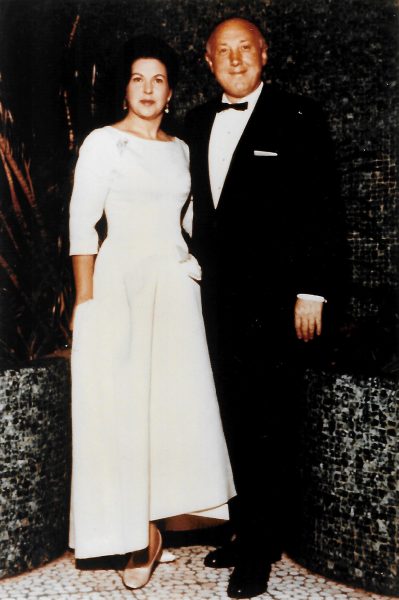
About Lillian & Sol Goldman
Sol Goldman was a self-made real estate investor who amassed hundreds of properties during his half-century career, becoming the single largest private landlord in New York City. During the Depression while working for his family grocery business in Brooklyn, New York, Mr. Goldman purchased his first building at age 17. By the relatively young age of 47, Mr. Goldman became the biggest non-institutional real estate investor in New York. He ultimately built a portfolio of nearly 600 commercial and residential properties throughout the United States. Perhaps the words of the honorary Doctorate of Humane Letters bestowed upon him by Long Island University best encapsulate his career, "For nearly half a century, almost always you have bought, built and bettered, committing time, energy and money to finding prosperity where others had faltered. Reclaimer and risk-taker, dreamer of buildings and builder of dreams, you are a true urban pioneer." Mr. Goldman was a great philanthropist donating generously to hospitals in New York and the Jewish community worldwide. His legacy as a philanthropist lives on through The Sol Goldman Charitable Trust. Above all, he was a warm and embracing husband, father and grandfather.
The Goldman family was drawn to Johns Hopkins when Lillian Goldman, Sol's wife for nearly fifty years, died of pancreatic cancer in 2002. A devoted wife, mother, grandmother and great-grandmother, she was a nurturing, quick-witted soul. As an astute businesswoman, Mrs. Goldman was a strong partner in the highly successful real estate enterprise. Through her philanthropy, she dedicated herself to the task of meeting essential human needs, both immediate and long-term focused on the developmental well-being of children; the equality of opportunity for women; and medical research. Mrs. Goldman was also committed to knowledge. The Lillian Goldman Law Library at Yale Law School, in memory of Sol Goldman, serves as an enduring repository of knowledge. This acclaimed center of legal learning in the United States is complemented by Mrs. Goldman's support of scholarship of fellows from around the world.
Thanks to the efforts of the Goldman's talented children-Jane, Amy, Diane and Allan-the real estate business has become a strong and enduring family venture. Jane Goldman, Sol and Lillian's youngest daughter and Trustee of The Sol Goldman Charitable Trust, decided to take action against pancreatic cancer, the disease that took their mother's life. With the help of her husband, Dr. Benjamin Lewis, the family approached the team at Johns Hopkins with the goal of endowing the leading pancreatic cancer research center that would not only combat this terrible disease, but would also honor the legacy of Jane's parents. They chose Johns Hopkins for its established expertise, as well as its cutting-edge, innovative research efforts in the field of pancreatic cancer.

